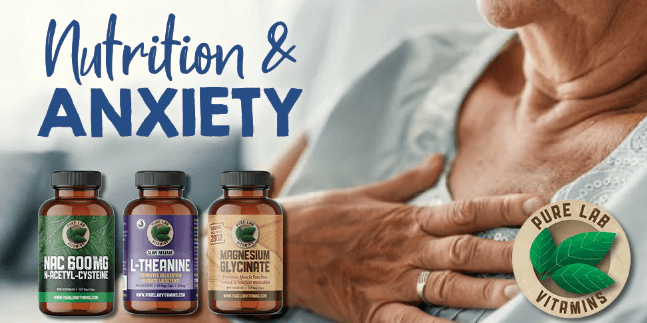The Connection Between Nutrition and Anxiety: The Power of Vitamins and Supplements

Anxiety, a common mental health condition that affects millions of people worldwide, is characterized by excessive worry, fear, and nervousness. It can significantly impact an individual’s quality of life, leading to difficulties in various areas, such as work, relationships, and daily activities. While anxiety is often treated with therapy, medication, and other interventions, research has also shown that nutrition plays a crucial role in managing anxiety symptoms. In this article, we will explore the connection between anxiety and nutrition, highlighting the impact of diet on mental health.
The Gut-Brain Axis: How Nutrition Affects Anxiety
The gut-brain axis refers to the intricate connection between the gut and the brain, where the two organs communicate bidirectional through various pathways, including the nervous system, immune system, and hormonal pathways. Emerging research has demonstrated that the gut-brain axis plays a crucial role in mental health, including anxiety.
Gut Micro bacteria:
One key factor in the gut-brain axis is the gut microbiota, which refers to the trillions of bacteria and other microorganisms residing in the gastrointestinal tract. The gut microbiota has been found to influence brain function, including mood, cognition, and behavior. Research has shown that an imbalance in the gut microbiota, known as dysbiosis, can contribute to the development and exacerbation of anxiety symptoms.
Shaping the Composition:
Nutrition plays a critical role in shaping the composition and diversity of the gut microbiota. A diet that is high in processed foods, added sugars, and unhealthy fats can disrupt the balance of the gut microbiota, leading to dysbiosis. On the other hand, a diet that is rich in fiber, whole grains, fruits, vegetables, lean proteins, and healthy fats can promote a diverse and healthy gut microbiota, which may help to alleviate anxiety symptoms.
The Role of Specific Nutrients in Anxiety Management
Several nutrients have been shown to have a significant impact on anxiety. Here are some key nutrients and their potential effects on anxiety:
Antioxidants:
Antioxidants, including vitamins C and E, and selenium, help reduce oxidative stress in the body, which can contribute to anxiety. Foods rich in antioxidants include fruits, vegetables, nuts, seeds, and whole grains.
Probiotics:
Probiotics are beneficial bacteria that can help restore and maintain a healthy gut microbiota. Probiotic-rich foods include yogurt, kefir, sauerkraut, kimchi, and other fermented foods.
The Importance of a Balanced Diet for Anxiety Management
While specific nutrients play a crucial role in managing anxiety, it’s important to note that a balanced and varied diet is key to overall mental health. Eating a diverse range of foods that are nutrient-dense and minimally processed can provide the body with the essential nutrients it needs to function optimally, including supporting brain health and managing anxiety. You should be taking the strongest anxiety vitamins with a balanced diet to find a better cure of your anxiety disorder.
Mental Health Issues and Nutrition
Stress and depression are two prevalent mental health issues that can significantly impact a person’s overall well-being. While various factors contribute to the development of stress and depression, including genetic, environmental, and psychological factors, nutrition plays a vital role in managing these conditions. Research has shown that the food we eat can significantly impact our mental health, and making healthy dietary choices can have a positive effect on managing stress and depression.
The Impact of Nutrition on Depression
Depression is a mood disorder characterized by persistent feelings of sadness, anxiety and other mental issues. Nutrition can play a significant role in managing depression, as certain nutrients are essential for brain health and neurotransmitter function.
Protein:
Protein is essential for the production of neurotransmitters in the brain, which play a crucial role in mood regulation. Consuming adequate amounts of protein, including lean meats, legumes, and dairy products, can help support neurotransmitter function and improve mood.
Complex carbohydrates:
Complex carbohydrates, such as whole grains, fruits, and vegetables, provide a steady source of energy to the brain and help regulate blood sugar levels. This can help stabilize mood and prevent mood swings often associated with depression.
Tips for Incorporating Nutritious Foods into Your Diet to Reduce Anxiety
Incorporating nutritious foods into your diet can be a simple and effective way to manage stress and depression. Here are some tips for making healthy dietary choices with anxiety vitamins.
Eat a balanced diet:
Aim to include a variety of foods from all food groups, including fruits, vegetables, whole grains, lean proteins, and healthy fats. This will ensure you are getting a wide range of essential nutrients that support mental health.
Limit processed foods and added sugars:
Processed foods and added sugars can lead to inflammation in the body and negatively impact mood. Limit your intake of processed foods, sugary snacks, and beverages, and opt for whole, natural foods whenever possible.
Stay hydrated:
Dehydration can worsen mood swings and increase stress levels. Make sure to drink enough water throughout the day to stay properly hydrated.
Use Supplements:
You should use supplements for anxiety to incorporate nutrition in your daily diet. It would help you to improve your mental health in a better way. It is the best opportunity for you to resolve your behavioral disorders with the help of the strongest multi-symptom relief, with natural treatment with the best brain formula supplement from adhdsnap.com.
Conclusion
To sum up, I would like to say that as research continues to shed light on the connection between nutrition and mental health, it is becoming increasingly clear that diet plays a crucial role in anxiety management. Adopting a healthy and balanced diet, while avoiding excessive sugar and caffeine, incorporating gut-friendly foods, and considering specific nutritional approaches, may all contribute to reducing anxiety symptoms. It is important to consult with a healthcare professional or registered dietitian before getting started, even with using the strongest and best supplements for anxiety to improve emotional regulation.





